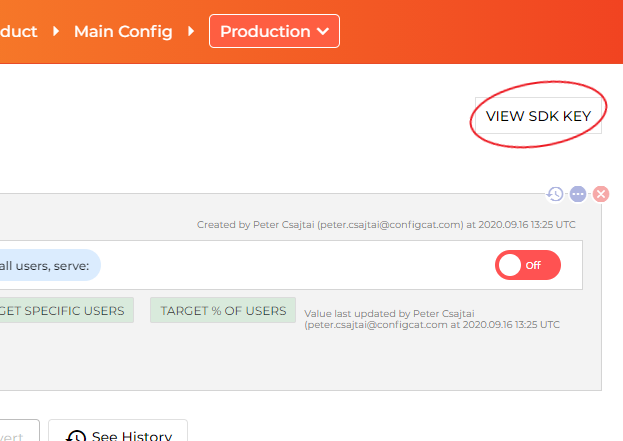Gathering detailed insights and metrics for configcat-node
Gathering detailed insights and metrics for configcat-node
Gathering detailed insights and metrics for configcat-node
Gathering detailed insights and metrics for configcat-node
configcat-common
ConfigCat is a configuration as a service that lets you manage your features and configurations without actually deploying new code.
configcat-js
ConfigCat is a configuration as a service that lets you manage your features and configurations without actually deploying new code.
configcat-react
ConfigCat is a configuration as a service that lets you manage your features and configurations without actually deploying new code.
configcat-js-ssr
ConfigCat Feature Flags for Server Side Rendered apps like NuxtJS. Official ConfigCat SDK for Server Side Rendered to easily access feature flags.
npm install configcat-node96.6
Supply Chain
99.5
Quality
83.5
Maintenance
100
Vulnerability
100
License
Module System
Min. Node Version
Typescript Support
Node Version
NPM Version
19 Stars
339 Commits
7 Forks
5 Watching
2 Branches
19 Contributors
Updated on 08 Oct 2024
Minified
Minified + Gzipped
TypeScript (96.34%)
Shell (1.96%)
JavaScript (1.71%)
Cumulative downloads
Total Downloads
Last day
1.3%
13,754
Compared to previous day
Last week
1.9%
70,198
Compared to previous week
Last month
15.7%
286,635
Compared to previous month
Last year
55.2%
2,728,296
Compared to previous year
ConfigCat SDK for Node.js provides easy integration for your application to ConfigCat.
ConfigCat is a feature flag and configuration management service that lets you separate releases from deployments. You can turn your features ON/OFF using ConfigCat Dashboard even after they are deployed. ConfigCat lets you target specific groups of users based on region, email or any other custom user attribute.
ConfigCat is a hosted feature flag service. Manage feature toggles across frontend, backend, mobile, desktop apps. Alternative to LaunchDarkly. Management app + feature flag SDKs.
via NPM package:
1npm i configcat-node
1const configcat = require("configcat-node");

1const configCatClient = configcat.getClient("#YOUR-SDK-KEY#");
You can acquire singleton client instances for your SDK keys using the
getClient("<sdkKey>")factory function. (However, please keep in mind that subsequent calls togetClient()with the same SDK Key return a shared client instance, which was set up by the first call.)
The async/await way:
1const value = await configCatClient.getValueAsync('isMyAwesomeFeatureEnabled', false);
2
3if (value) {
4 do_the_new_thing();
5} else {
6 do_the_old_thing();
7}or the Promise way:
1configCatClient.getValueAsync('isMyAwesomeFeatureEnabled', false) 2 .then((value) => { 3 if (value) { 4 do_the_new_thing(); 5 } else { 6 do_the_old_thing(); 7 } 8 });
Using this feature, you will be able to get different setting values for different users in your application by passing a User Object to getValueAsync().
Read more about Targeting here.
1const userObject = new configcat.User("#USER-IDENTIFIER#");
2const value = await configCatClient.getValueAsync('isMyAwesomeFeatureEnabled', false, userObject);
3
4if (value) {
5 do_the_new_thing();
6} else {
7 do_the_old_thing();
8}The ConfigCat SDK supports 3 different polling mechanisms to acquire the setting values from ConfigCat. After latest setting values are downloaded, they are stored in the internal cache then all requests are served from there. Read more about Polling Modes and how to use them at ConfigCat Docs.
Contributions are welcome. For more info please read the Contribution Guideline.
You might run into errors caused by the wrong version of Node.js. To make sure you are using the recommended Node.js version follow these steps.
nvm install. This will install the compatible version of Node.js.nvm use. This will use the compatible version of Node.js.
No vulnerabilities found.
Reason
no dangerous workflow patterns detected
Reason
no binaries found in the repo
Reason
license file detected
Details
Reason
packaging workflow detected
Details
Reason
Found 29/30 approved changesets -- score normalized to 9
Reason
SAST tool is not run on all commits -- score normalized to 4
Details
Reason
2 commit(s) and 0 issue activity found in the last 90 days -- score normalized to 1
Reason
detected GitHub workflow tokens with excessive permissions
Details
Reason
no effort to earn an OpenSSF best practices badge detected
Reason
project is not fuzzed
Details
Reason
dependency not pinned by hash detected -- score normalized to 0
Details
Reason
security policy file not detected
Details
Reason
21 existing vulnerabilities detected
Details
Score
Last Scanned on 2024-11-25
The Open Source Security Foundation is a cross-industry collaboration to improve the security of open source software (OSS). The Scorecard provides security health metrics for open source projects.
Learn More